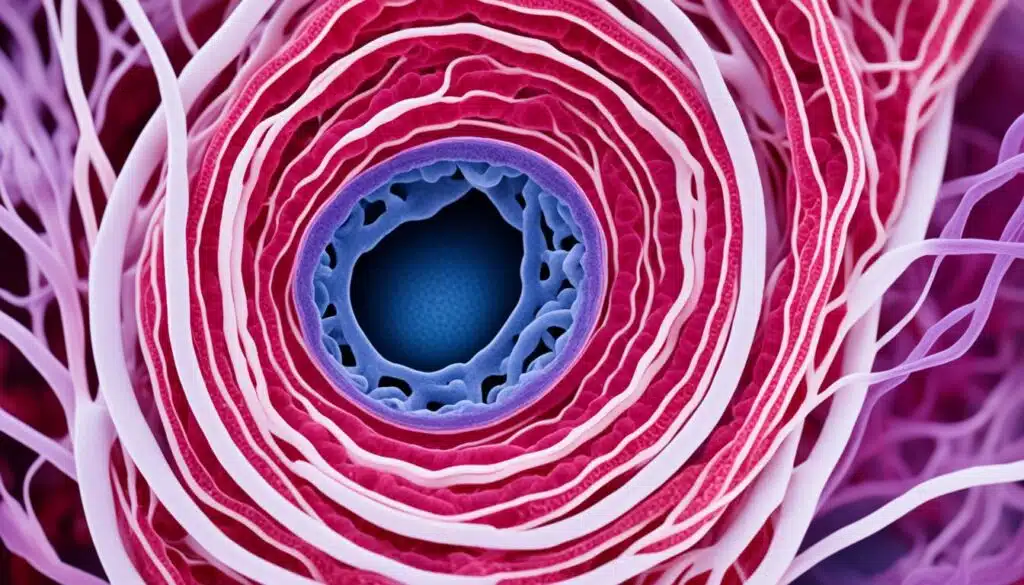Polycystic ovary syndrome, or PCOS, is a hormonal disorder common among women of reproductive age. It causes a hormonal imbalance, leading to symptoms like irregular periods, excessive hair growth, and more. Without treatment, PCOS can cause serious issues like diabetes and heart disease.
To manage PCOS, a combination of steps is often needed. These include changing your diet, regular exercise, and reducing stress. It’s about improving how your hormones work and how your body handles insulin. This can help control symptoms, lower related health risks, and better your life overall.
Key Takeaways
- PCOS is a common hormonal disorder that can lead to a range of symptoms and increase the risk of serious health complications.
- Dietary changes, such as reducing carbohydrate and sugar intake, increasing fiber, and focusing on anti-inflammatory foods, can play a crucial role in PCOS management.
- Regular exercise, including aerobic, resistance, and mind-body activities, can help improve insulin sensitivity and support weight management in individuals with PCOS.
- Stress management and maintaining good mental health are essential for managing PCOS, as chronic stress can exacerbate symptoms and contribute to comorbidities.
- Addressing insulin resistance and hormonal imbalances is key to effectively managing PCOS and reducing the risk of related health issues.
Understanding PCOS
PCOS stands for Polycystic Ovary Syndrome. It’s a disorder that affects women in their reproductive years. This issue comes from a mix-up in the body’s hormones. More male hormones (androgens) and a problem called insulin resistance are often involved. These troubles can cause small cysts to form on the ovaries, a key sign of PCOS.
What is PCOS?
Polycystic Ovary Syndrome is all about hormone ups and downs. This can lead to small cysts forming on the ovaries. These changes can make it hard for the body to ovulate as it should. PCOS is affected by many things like genes, how the body processes food, and the world around us.
Symptoms of PCOS
PCOS can show itself in several ways. It might cause periods to be irregular or even stop. You might notice more hair than usual, especially on your face. Skin problems like acne can also pop up. Managing weight can be tough. These issues happen because of the changing hormones. Women with PCOS might also find it harder to get pregnant. There’s also a higher chance of other health problems, including diabetes and heart disease.
Risk Factors and Complications
Being overweight, having family members with PCOS, and certain genes can raise your PCOS risk. Not dealing with PCOS can lead to serious health troubles. These include conditions like diabetes, high blood pressure, and even cancer. Mental health can take a hit too, with issues like anxiety or depression. It’s important to know these risks and deal with them early for a healthier life.
Dietary Modifications for PCOS

Diet changes are key for women dealing with polycystic ovary syndrome (PCOS). They often face insulin resistance. Eating a balanced, low-carb diet helps. This diet cuts down on refined carbs and sugars to manage blood sugar and inflammation, important for handling this hormonal issue.
Reducing Carbohydrates and Sugars
Eating less of refined carbs like white bread, pasta, and pastries, as well as added sugars in junk food, is vital for PCOS. This method keeps blood sugar spiking and insulin reaction in check, essential for PCOS care.
Increasing Fiber Intake
Adding more high-fiber foods helps those with PCOS. It includes veggies, fruits, and whole grains. Fiber slows carb absorption, boosts how the body responds to insulin, and helps with metabolism. Plus, it helps control blood sugar and provides other health benefits.
Anti-Inflammatory Foods
Eating anti-inflammatory foods is good for fighting PCOS-related inflammation. Things like fish, nuts, and olive oil contain omega-3 fatty acids. These can lower inflammation and its issues.
Whole Grains and Low Glycemic Index Foods
Going for whole grains and low-glycemic index foods is also important. They break down slowly, keeping blood sugar levels steady. This supports weight control and is key in treating PCOS.
By making these diet changes, those with PCOS can better their health. Addressing both metabolic health and inflammation makes a difference. Working with a dietitian on a personalized meal plan is a smart move. It meets each PCOS patient’s nutritional needs.
Weight Management for PCOS

Managing your weight is key for handling PCOS (Polycystic Ovary Syndrome) well. If you have extra weight, it can make PCOS symptoms worse and boost your chances of other health issues. Even losing a little weight can make a big difference.
It can help boost how your body uses insulin, lower inflammation, and bring back regular periods and the chance to have babies for those struggling with PCOS.
Importance of Weight Loss
Reaching a healthy weight is vital for those with PCOS. Weight loss changes everything for the better, from health to happiness. It can enhance insulin’s effects, control blood sugar, and slash the risk of diabetes.
What’s more, losing weight cuts down on the inflammation that links closely with PCOS.
Portion Control and Calorie Counting
Watching how much you eat and counting your calories are great for managing your weight with PCOS. This way, those with PCOS can slowly lose weight by eating less than their body needs. Dietitians can help by putting together meal plans and workout schedules that are just right for your pcos weight management and pcos weight loss efforts. But remember, it’s not just about food. Living well and exercising, along with eating nutritious, low-sugar foods, are key parts of the plan.
Exercise and Physical Activity

Regular pcos exercise and pcos physical activity are key for those with polycystic ovary syndrome (PCOS). Mixing up your workouts helps your body in many ways. It makes you more sensitive to insulin, lowers inflammation, and keeps your weight in check.
Aerobic Exercise
Cardio activities like fast walking, biking, or swimming are great for PCOS folks. Doing these boosts how well your body uses insulin, helps burn fat, and keeps your heart healthy. These benefits lower the chances of issues linked to PCOS.
Resistance Training
Pcos resistance training is also important. Lifting weights, for example, helps your body use insulin better and speeds up your metabolism. This leads to improved blood sugar and possibly dropping some pounds.
Mind-Body Exercises
Pcos mind-body practices, including pcos yoga, pcos pilates, and Tai Chi, are precious for those with PCOS. They do wonders for your body and mind. Doing these regularly can cut down on stress, leading to a better mood and sleep.
The best exercise plan for PCOS includes a variety of activities. It’s about picking things you love and can stick to every day. This kind of pcos exercise helps improve how your body works, manages symptoms, and improves life quality all around.
Stress Management and Mental Health

Managing stress is key to dealing with PCOS. Stress can make PCOS symptoms worse and lead to issues like anxiety and depression. Using techniques such as meditation, deep breathing, and mindfulness can make a big difference. These methods improve mental health and help with PCOS management.
It’s also important to take care of yourself. Talking to mental health experts and joining PCOS support groups can really help. They offer support, coping skills, and a sense of belonging. All these things are critical for a holistic PCOS well-being approach.
Herbal and Natural Remedies for PCOS

There’s not a lot of hard proof regarding the use of pcos natural remedies and pcos herbal medicine. But, some research points to possible benefits for PCOS symptoms from certain herbs and supplements. For instance, cinnamon can boost pcos insulin sensitivity. It is known to help some women with PCOS have steadier menstrual cycles.
St. John’s Wort might relieve pcos depression and pcos anxiety, which often come with PCOS. Licorice root is being looked into because it might lower pcos androgen levels and improve pcos ovulation. Yet, it’s critical to talk to medical experts before adding any pcos herbal or pcos alternative medicine to your PCOS care. This is because they could interfere with your medication or cause other issues.
Part of a pcos holistic health plan includes using pcos supplements and pcos vitamins. But you should always collaborate with your doctor to make sure these pcos natural remedies fit well with your PCOS treatment.
Insulin Resistance and PCOS

Insulin resistance is a critical part of PCOS. It is key in how the condition starts and gets worse. Those with PCOS struggle to use insulin well. This leads to high blood sugar levels and raises the risk of type 2 diabetes.
Understanding Insulin Resistance
When the body’s cells don’t respond well to insulin, we call it insulin resistance. Insulin normally keeps our blood sugar levels in check. But with insulin resistance, these levels can get too high. This leads to the metabolic health problems that often come with PCOS.
Dietary Strategies for Insulin Resistance
Eating certain foods can help with insulin resistance. For example, cutting back on carbohydrates and eating more fiber can be good. Choosing foods with a low glycemic index is also helpful. These changes can boost insulin sensitivity and manage blood sugar levels for those with PCOS.
Exercise and Insulin Sensitivity
Working out regularly, especially with resistance training, improves insulin sensitivity. This is good for metabolic health in PCOS patients. Exercise helps the body use insulin better. It’s a key part of handling insulin resistance and lowering diabetes risks.
Dealing with insulin resistance is crucial for PCOS care. It helps lessen symptoms, boost metabolic health, and lower health issues risk. A mix of healthy eating, exercising, and maybe some medicine can make a big difference for those with PCOS. This approach can help manage insulin resistance and improve overall health.
Hormonal Imbalance and PCOS

Polycystic ovary syndrome, or PCOS, means your hormones are out of whack. You have too many male hormones and not enough female ones. This can make tiny cysts grow on your ovaries. It also causes weird periods, too much body hair, and trouble getting pregnant.
Role of Androgens in PCOS
PCOS involves making too much testosterone, which is a male hormone. This high testosterone level is tied to the cysts in the ovaries. It also shows up as too much body hair, pimples, and hair loss. Dealing with the extra male hormones is key in PCOS treatment.
Lifestyle Changes for Hormonal Balance
Good news! You can help balance your hormones with lifestyle changes. Focus on keeping a pcos weight and eating lots of healthy, fresh food. Don’t forget to pcos exercise regularly, too. These steps can help your periods get back on track and make it easier to get pregnant. They also up your chances of releasing eggs regularly.
Also Read : Holistic Approaches To Disease Prevention: Integrating Body, Mind, And Spirit
Conclusion
Dealing with PCOS needs many steps. You should change your diet, exercise often, manage stress, and sometimes use herbal remedies. These steps help fix the hormone issues and insulin problems. Doing this makes living with PCOS easier and cuts down on health risks.
It’s key for PCOS folks to team up with their doctors and other experts like endocrinologists, gynecologists, registered dietitians, and mental health pros. Together, they will make a plan just for you. This holistic style of managing PCOS boosts overall wellness and keeps other health issues at bay.
Research in PCOS never stops, meaning better treatments are always coming. By keeping up and working closely with their team, PCOS warriors can get better and sustain life quality improvements.





